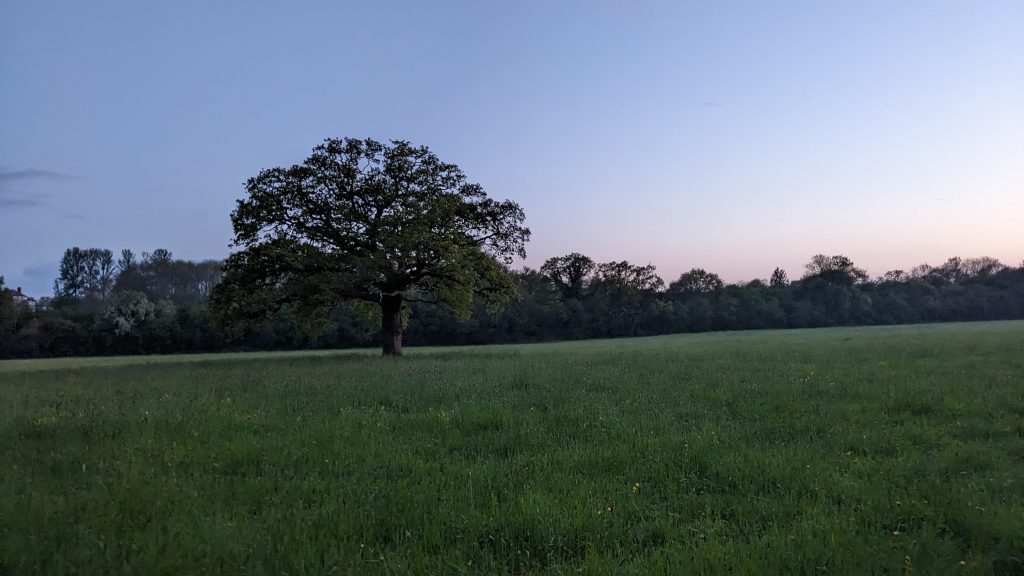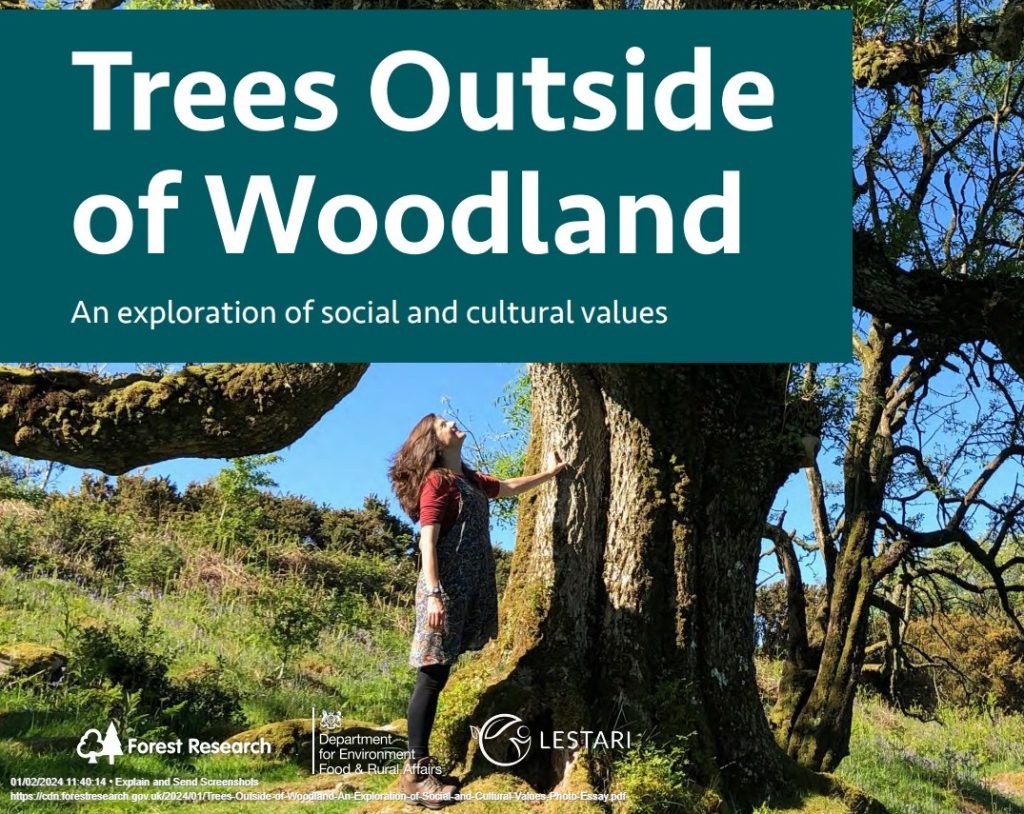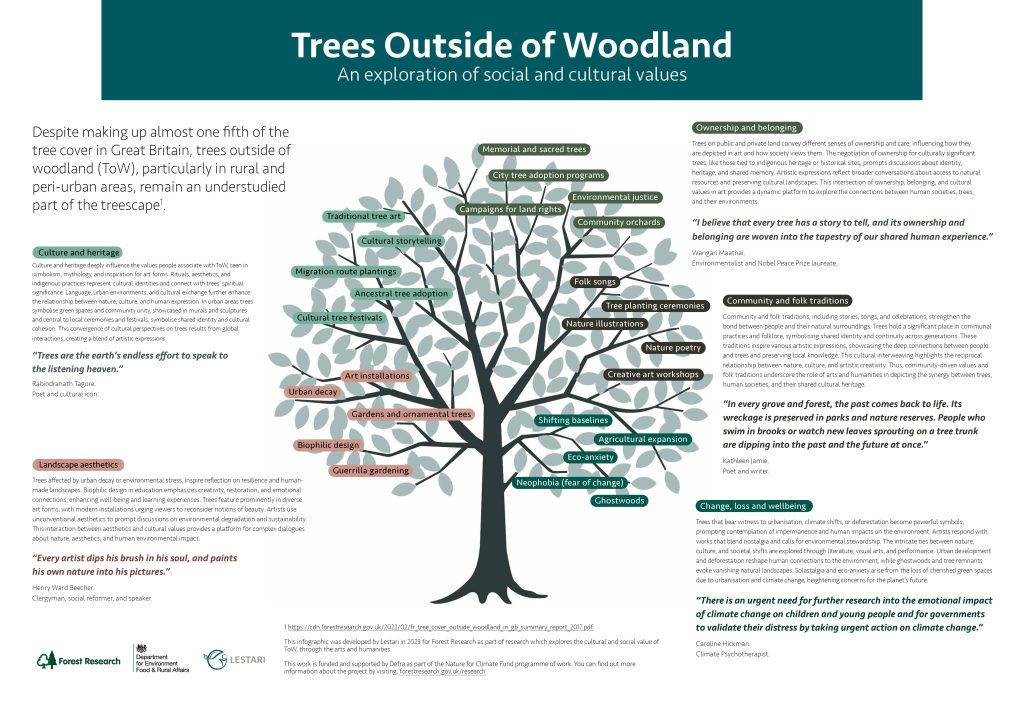Trees outside of woodland
Lestari worked with Forest Research in 2023 to explore the range of cultural and social values of trees outside of woodland, through the lens of the arts and humanities. The project developed a collection of mini explainers including a scoping review, photo essay, and podcast series available below.
valuing trees outside of woodlands
In 2023, Lestari worked together with Forest Research and a diverse range of creative individuals to explore the cultural and social values of trees outside of woodland (ToW), through the lens of the arts and humanities.
Despite making up almost one fifth of the tree cover in Great Britain, ToW, particularly in rural and peri-urban areas, remain an understudied part of the treescape. ToW exist in many forms including hedgerows, scrub, wood pasture, orchards, copses, groves, linear treelines, greenways/holloways, and lone trees. The arts and humanities offer valuable perspectives to support the exploration of their social and cultural value.
The Defra (Nature Climate Fund) funded project outputs comprise a collection of mini explainers including a literature review, photo essay, and podcast series delivering a multi-faceted exploration of the cultural and social values associated with ToW:
1. The Treelands podcast miniseries (links below) offers an audio exploration of ToW by incorporating diverse perspectives through stories, music, and poetry, seeking to enhance listeners’ appreciation for the cultural significance of ToW. Utilising a podcast format that emphasises emotive in-situ experiences, the episodes feature physical journeys to trees and reflections on projects, employing strong narrative structures to engage a broad audience, including tree policy and landscape specialists, as well as the general public, fostering a deeper understanding and appreciation for the value of trees in historical and contemporary cultures.
2. A photo essay was crafted from interviews and written submissions by artists/creatives and researchers, incorporating diverse media such as writing, poetry, painting, printmaking, music, storytelling, and archaeology in a collection of 16 vignettes to engage and explore the lives of ToW. Dr Susan Warren led on this element of work.
DOWNLOAD: Trees Outside of Woodland – An Exploration of Social and Cultural Values – Photo Essay
3. A scoping review of the literature, which integrates diverse perspectives from language, art, history, literature, folklore, and landscape studies, exploring a wide range of social and cultural values associated with ToW. The thematic focus includes culture, heritage, landscape aesthetics, ownership, belonging, community traditions, and change, loss, and wellbeing.
DOWNLOAD: Trees Outside of Woodland – An Exploration of Social and Cultural Values – Scoping Review
4. Trees outside of Woodland Infographic, illustrating the findings from an exploration of the arts and humanities literature available on social and cultural values relating to trees outside of woodland.
DOWNLOAD: Trees Outside of Woodland – An Exploration of Social and Cultural Values – Infographic
1. Treelands Podcast Miniseries
This miniseries was developed by the Lestari in association with Stellaria Media in 2023 on behalf of Forest Research as part of their work to explore the cultural and social value of trees outside of woodland. Despite making up around a fifth of the tree cover in Great Britain, trees outside of woodland, particularly in rural and peri urban areas, remain an understudied part of the treescape.
This project is funded and supported by Defra as part of the Nature for Climate Fund program of work. You can find out more information about the project by following the links in the show notes. We hope you enjoy listening.
Episode One: The Hawick Hawthorn
Lewis Winks and Miwa Nagato-Apthorp
Lewis travels to Hawick in the Scottish Borders to meet the British Japanese singer and songwriter Miwa Nagato-Apthorp to discuss the significance of the Hawthorn in modern folk culture and to explore the ways in which Hawthorns have shaped story and song over time With the help of Miwa’s own song ‘The Hawthorn’, we delve into the entwined cultural and ecological life of this borderland tree This episode features Miwa singing her song ‘ and inviting listeners to learn and adapt the song themselves.
You can find out more about Miwa’s work on the Alchemy Arts website, or on Instagram @miwanagato
Episode Two: The Quest for the Watern Oak
Lewis Winks and Guy Shrubsole
Lewis Winks and author and environmental campaigner Guy Shrubsole venture into the heart of Dartmoor in Devon, in search for a long recorded Oak tree, named the Watern Oak a tree which has appeared on maps since 1809 and which is mentioned in various written records of travellers journeying across the moors.
Will they find the Watern Oak, or are they searching for ghosts?
This episode considers the place trees have in our minds as well as in the landscape, and how the recording and celebrating of individual trees can be both deceptive as well as illuminating.
Guy Shrubsole is the author of two books Who Owns England, and The Lost Rainforests of Britain and is the recipient of the 2023 Wainwright Prize for nature writing. Read Guy’s Twitter thread about the journey to the Watern Oak.
Episode Three: Exeter Tree Tales
Rose Ferraby, Joss Smith, Luke Thompson
In 2016 a small team worked with the local community in Exeter to create Exeter Tree Tales It was a collection of people’s stories about people’s connections and stories with trees around the city These connections were brought together with an artist’s map plotting their locations.
In this episode the original team come back together seven years on to share some of the findings and reflect on the project, what it can reveal about our cultural connections to trees, and how this might influence broader thinking into the future.
Exeter Tree Tales ran in 2016. You can find out more about the project on the Common Ground Website.
2. Photo Essay
This photo essay explores different aspects of Trees Outside of Woodland from these social and cultural perspectives. It was created from interviews with, and written submissions from, artists/creatives and researchers.
A variety of media including writing, poetry, painting, printmaking, music, storytelling, and archaeology are used by these contributors to engage with and explore the lives of Trees Outside of Woodland.
Authors include: Joe Webster, Bryony Benge-Abbott, Stewart Taylor, Nicola Chester, Lisa Schneidau, Suzanne Iuppa, Nicola Davies, Rose Ferraby, Jackie Morris, Volkhardt Muller, Tom Hirons, Amy Jane-Beer, Nick Hayes, Miwa Nagato-Apthorp, Wyl Menmuir, and Annie Tindley.
<<<< Click to download and explore!
4. Infographic
With Union Studios, we designed this infographic (below) to illustrate the findings from the scoping review (see above), as an exploration of the arts and humanities literature available on social and cultural values relating to trees outside of woodland.
DOWNLOAD: Trees Outside of Woodland – An Exploration of Social and Cultural Values – Infographic





